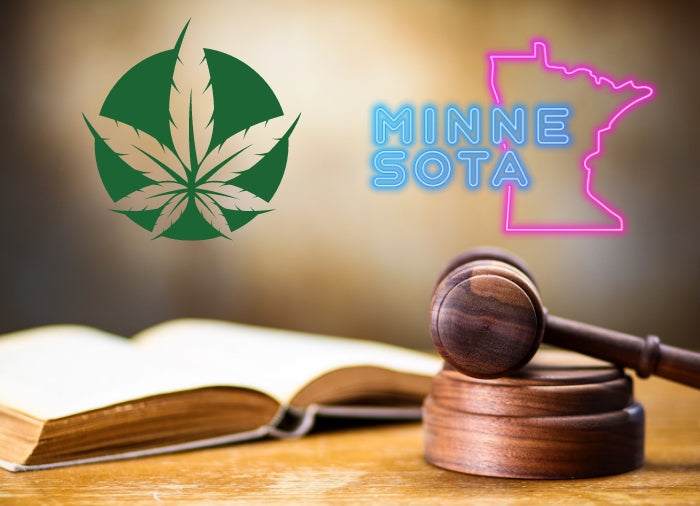The measure passed by both state legislature chambers last week arrived on the governor's desk over the weekend.

Following six months of committee hearings, numerous debates, a myriad of amendments, and a special bicameral session to reconcile differences between the House and Senate versions, a bill legalizing adult-use marijuana in the state of Minnesota is expected to be signed by Governor Tim Walz (DFL) early next week.
According to multiple media outlets, lawmakers from both chambers of the state legislature approved the final iteration of the measure on Saturday and sent it directly to Governor Walz, who reaffirmed he would sign the historic legislation at a special ceremony after the Memorial Day Holiday Weekend.
When he officially affixes his signature to the bill, Minnesota will become the 23rd state to legalize recreational cannabis for adults 21 and older in the United States. Among many of the provisions provided by the new law, one key aspect differentiating Minnesota from other states is that its marijuana legalization measure enables cannabis companies to sell hemp-derived products, including items containing the controversial delta-8 THC cannabinoid variant.
Other key features of the legalization reform include:
- Beginning August 1, 2023, adults 21 and older can consume and cultivate small quantities of cannabis.
- Sales at retail dispensaries, which will not begin for at least another year, will be subject to a 10% tax.
- Retailers will be limited to up to five locations.
- Cultivation licenses have a cap of 15,000 square feet of canopy.
- Vertical integration will be allowed for small businesses or companies that manufacture and sell low-THC hemp-derived products.
- A new Office of Cannabis Management will be established to regulate the market and issue cannabis business licenses.
While Minnesotans will be able to grow, possess and consume small amounts of marijuana beginning at the end of July, it will be another 12 to 15 months before cannabis businesses can begin selling marijuana products through licensed retailers. However, that timeline is intentional, according to Gov. Walz.
At a press briefing on Sunday, he said, "It's going to take a while. We have to put the regime into place. We'll have to make sure the licensing stands up. And what we've said is—what you're going to have certainty about it—is that you're going to know what the product you're buying is, there's going to be a regulated, safe environment, and we're going to be able to stand that up."
"It's going to take a while. We have to put the regime into place. We'll have to make sure the licensing stands up. And what we've said is—what you're going to have certainty about it—is that you're going to know what the product you're buying is, there's going to be a regulated, safe environment, and we're going to be able to stand that up."
- Minnesota Governor Tim Walz (DFL)
Much of the motivation for ending the prohibition of cannabis in the state centers around the devastating effects of the opioid crisis, claiming lives from overdoses and cross-contamination across the state. By legalizing cannabis and creating a regulatory mechanism to test and safeguard products for adult consumers, the governor and state house leaders hope to stem the deadly tide from drugs like fentanyl, heroin, and unregulated synthetic cannabinoids.
In a separate interview, Walz reiterated this stance, saying the legislation serves a critical public health purpose by providing access to regulated and tested products to prevent contamination with "fentanyl and xylazine and things we're seeing show up on street cannabis. I trust adults to make their own decisions. We certainly believe [ending the] prohibition on cannabis is long overdue, and we'll get that out there. We'll have it legally."
"I trust adults to make their own decisions. We certainly believe [ending the] prohibition on cannabis is long overdue, and we'll get that out there. We'll have it legally."
- Minnesota Governor Tim Walz (DFL)
To that end, the legislation explicitly allows retailers to sell products that detect the presence of fentanyl, the synthetic opioid responsible for a majority of the more than 109,000 overdose deaths in America in 2022, according to the Centers for Disease Control and Prevention (CDC).
While cannabis legalization advocates, potential marijuana businesses, and cannabis enthusiasts across the state celebrate the bill's imminent transformation into law, some groups are concerned about the detrimental impacts the new law may have on tangential industries, like the hemp sector.
In response to those concerns, sponsors of the legislation promised protections for the existing medical marijuana and hemp industries in the final version of the legalization measure. However, organizations like the Minnesota Industrial Hemp Association (MIHA) fear those changes may be little more than political window-dressing to appease the fears of small hemp business entrepreneurs.
One definite benefit to the bill's deliberate construction is the built-in year-long buffer from when the law goes into effect and retail sales begin. Hopefully, in that interim period, lawmakers and industry stakeholders can come together and either add legislation to bolster the legalization reform or revise the new law to provide "common sense" protection for a supportive and vital sister industry to the cannabis market many Minnesotans have anticipated coming to fruition for so long.






































